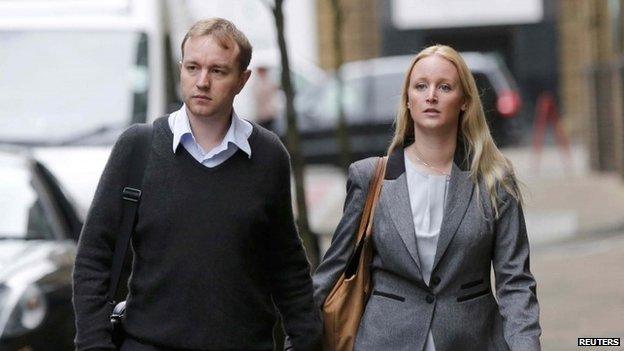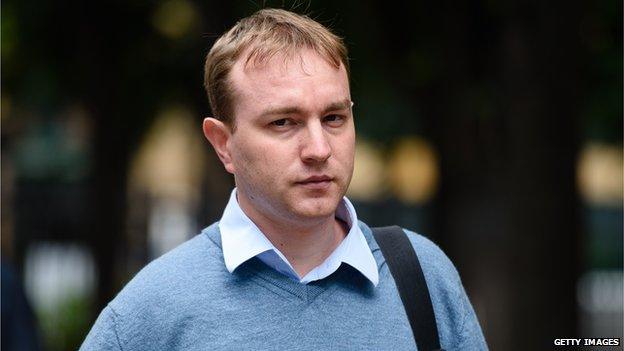Libor trader: Who is Tom Hayes?
- Published

Tom Hayes is the first individual to be convicted in the Libor fixing scandal and has been sentenced to 14 years in prison.
During the course of the 9-week trial, the 35-year-old trader was portrayed by the prosecution as the "ringmaster" in a global conspiracy, but by the defence as a minor player who was "thrown under a bus" by his bank employers.
In the end the jury believed the prosecution counsel. So who is the man, nicknamed "the Rainman" by his colleagues, now convicted with conspiracy to manipulate one of the world's most important financial benchmark rates?
Money maker
Mr Hayes said he never had any great ambitions to go into the world of high finance.
Having spent his university summer holidays working in a restaurant kitchen, he decided that once he graduated he wanted to earn a bit more money than he earned cleaning out deep fat fryers and de-boning chicken.
Hayes gained a degree in maths and engineering from Nottingham University - just two years before Kweko Adeboli, the UBS trader jailed for unauthorised trades which cost the bank £1.4bn.
My managers knew, my manager's manager knew. In some cases the CEO [chief executive] was aware of it
Hayes' natural ability with numbers was enough to impress the recruiters at RBS, who offered him a place on their graduate trainee scheme in 2001.
There he had his first introduction to the workings of the financial markets, before moving on to Royal Bank of Canada and then to UBS in September 2006.
Scapegoat?
It was at the UBS office in Tokyo that he started trading a financial product based on the Libor rate.
Libor: What is it and why does it matter?
Mr Hayes didn't deny that while at UBS, and subsequently at Citibank, he attempted to manipulate the Libor rate. Or that the conversations in online chatrooms and the bank's internal messaging system, that were used in evidence, were genuine.
But when the court heard that he was colluding to set the Libor rate to his own advantage, his response was that manipulating Libor was common practice at the banks where he worked and that his superiors were aware of what he was doing. He argued he was being made the scapegoat for wrongdoing when in reality many others had been involved long before he started in the industry.
None of that contradicts the prosecution's claims that he was an "extremely intelligent man" who used his gift for numbers to make huge profits for his employers- and in return received considerable remuneration.
'Frozen with fear'
Mr Hayes was paid £1.3m for just over three years' work at UBS, but he became frustrated believing the bank was reneging on a deal on his pay. He left to take up a similar position at Citi where he was then paid £3.5m for the nine months he worked there, before being sacked in September 2010 over allegations of manipulating the Libor rate.
Mr Hayes then returned to the UK and handed himself into the Serious Fraud Office.
He told the court that he was "frozen with fear" at the possibility he would be charged by the US authorities, saying he thought he could be jailed for decades. He ended up giving over 80 hours of recorded interviews to the SFO in which he admitted to his part in trying to manipulate the Libor rate.
"I mean I probably deserve to be sitting here because, you know, I made concerted efforts to influence Libor," Mr Hayes told the SFO.
"Although I was operating within a system or participating within a system in which it was commonplace, you know, ultimately I was someone who was a serial offender."
Mars bar deal
Having made the confession he subsequently pulled out of the SFO process and decided to fight the legal proceedings against him. He told the court that he felt more confident having his fate decided by 12 jurors than in what he called a 'politically driven process' brought by the SFO.

Hayes has had to fight against a huge weight of evidence showing Bloomberg instant messaging chats and other online exchanges which appeared to incriminate him.
In one chat he told an RBS trader: "Three-month Libor is too high, 'cos I've kept it artificially high". He explained he was able to do this by being 'mates' with traders at another bank.
In a phone call played to the court he offered 'a humungous deal' of $50,000 to $100,000 if his contact kept his Libor submission at a particular rate. But another time he suggested a mars bar was enough to persuade other traders to help fix the rate.
Who knew?
The judge told the jury that Mr Hayes had been diagnosed with a "mild" form of Asperger's syndrome, which meant that he saw issues in black and white rather than shades of grey.
During his evidence Hayes insisted he did not know or think he was doing anything dishonest as the activities were so common within the industry.
Mr Hayes told the court that he did not always fit in with his bank colleagues who nicknamed him "Tommy chocolate" due to his enthusiasm for drinking hot chocolate while others drank beer at social events.
He also said that his colleagues would mock him for keeping a childhood superhero duvet cover well into his adult life.
While on the stand Mr Hayes was keen to portray himself as part of wider system of wrongdoing in the banking system.
"I acted with complete transparency to my employers. My managers knew, my manager's manager knew. In some cases the CEO [chief executive] was aware of it," Mr Hayes told the court.
He denied that what he was doing was "clandestine" and said that he made no attempts to "cover his tracks", even posting on Facebook about his Libor related trades.
During the trial, Mr Hayes talked about how hard the legal process had been for his wife and young child.
He told the jury that he had found it hard not being able to work in the financial services sector since his arrest and that although he had studied for an MBA, he did not think he had been very good at it.
While the court case has put him firmly in the spotlight, there are other Libor trials to follow.
The SFO has charged 11 others over Libor rigging, having received special funding from the Treasury to pursue prosecutions.
For now Tom Hayes is the only individual to take the rap for his part in one of the most shameful episodes in financial history.